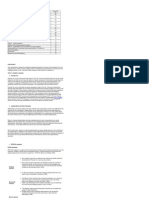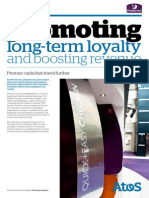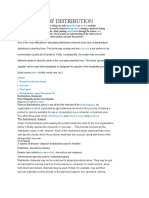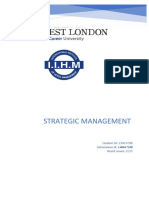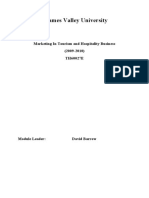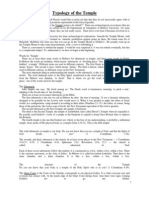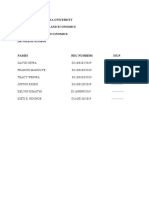Marriot SWOT Analysis
Marriot SWOT Analysis
Uploaded by
aznh1368Copyright:
Available Formats
Marriot SWOT Analysis
Marriot SWOT Analysis
Uploaded by
aznh1368Copyright
Available Formats
Share this document
Did you find this document useful?
Is this content inappropriate?
Copyright:
Available Formats
Marriot SWOT Analysis
Marriot SWOT Analysis
Uploaded by
aznh1368Copyright:
Available Formats
Marriot SWOT Analysis Strengths Global leader Marriott International Inc is the leader in the global hotels market,
, with a near 5% value share in 2007 and a large geographic presence. Unhampered by hotel ownership the company owns less than 1% of its hotel portfolio and is thus less vulnerable to real estate price fluctuations than rivals. Moreover, its emphasis on franchising facilitates the rapid expansion of its portfolio. Focused pipeline development Marriott International is pursuing a growth strategy to further consolidate its presence in foreign markets and capitalise on the booming travel and tourism industries of emerging markets, which should continue to serve its business well in terms of revenue over the forecast period. Unfortunately, the global economic downturn is hindering expansion plans, particularly as consumer confidence softens and demand for travel accommodation falls. Strong internet presence Marriott International's website guarantees the best rates available, enticing price-conscious consumers away from third party websites. IT solutions Marriott International is upgrading its properties with technology that responds to the needs of business and leisure travellers. In the latter part of the review period, for example, it has transformed its public areas to encourage guests to work and socialise through the adoption of the latest design, technology, food and beverage offerings. Weaknesses Domestic market focus despite international expansion, Marriott International remains heavily reliant on the US, making it sensitive to the changing fortunes of its domestic market. Luxury brands mid-scale and upscale hotel brands leave Marriott International vulnerable to any potential global economic downturns, particularly given that economy travel accommodation is gaining increased penetration in major destination markets. Courtyard brand the Courtyard brand is maturing and losing its core business customers. Industry experts believe the revitalisation process may not be enough to lure customers back mainly due to a fierce competitive environment, packed with exclusive offers and increasingly modern accommodation, particularly at a time when business travellers want to cut costs. Lack of a low-cost lifestyle brand Marriott International does not have a low-cost lifestyle brand in its product portfolio, like aloft from Starwood and Hotel Indigo from IHG. Uncertainty around the launch of "Edition" the launch of "Edition" by Marriott, a new genre of a lifestyle brand that combines an intimate and unique travel accommodation experience, will come at a turbulent period, characterised by weak demand for luxury hotels in the US.
Opportunities Emerging markets in order to offset the negative impact of such a challenging business environment and to capitalise on the opportunities present in emerging markets a number of hotels have turned to them. Marriott International is no different and Asia-Pacific countries became key target markets. Individuated experience the growing consumer demand for an individuated travelling experience is generating potential for hotel operators to develop distinctive brands, properties and services. Threats Consumer confidence general economic and business conditions, which adversely impact the income levels of potential travellers, coupled with a rising lack of confidence in strong markets like the US, can have a negative impact on Marriott International's operations. This is particularly true given its strong presence in North America, where it is the largest hotel brand in value terms with a strong focus on mid-scale and luxury brands. A downturn in business travel poor economic conditions are forcing businesses to reduce travel and spend less on travelling. Marriott's brands, especially the luxury brands, are likely to see less travellers. Economy brand development the rapid growth achieved by economy hotel brands in the last three years poses a potential threat for mid-scale, limited-service brands such as the SpringHill Suites. Credit crunch there is a fear that the global travel and tourism industry will see a corresponding slowdown in revenue as consumers spend and travel less in the short term. Marriott International is dependent on the availability of consumers willing to enter into credit agreements, and, therefore, a general spending reduction will result in a drop in revenue. This also applies to potential investment from prospective hotel owners and franchisees looking to fund construction, renovations and investments.
Source(s):
http://www.portal.euromonitor.com.ezprox
3 years ago
You might also like
- KimptonDocument13 pagesKimptonyhoissabNo ratings yet
- J W Marriott Report On & 7Ps in MarketingDocument19 pagesJ W Marriott Report On & 7Ps in MarketingVikrant Jaiswal86% (14)
- BELMOND HOTELS Portfolio - PetyaKalendzhieva - 21034997Document22 pagesBELMOND HOTELS Portfolio - PetyaKalendzhieva - 21034997Peps BlackNo ratings yet
- Marriott Competitive StrategyDocument7 pagesMarriott Competitive Strategyaakriti arora57% (7)
- Hotel MarketingDocument5 pagesHotel MarketingAl AminNo ratings yet
- Marriott PresentationDocument36 pagesMarriott PresentationMatthew Cua90% (10)
- Tune Hotel 5 Forces ReportDocument2 pagesTune Hotel 5 Forces ReportYL Hui100% (1)
- Marriott InternationalDocument31 pagesMarriott InternationalSalmAn WaraIch100% (3)
- Wyndham Hotels and ResortsDocument19 pagesWyndham Hotels and ResortsGohar100% (2)
- Property Level Benchmarking With STAR Reports ReviewDocument83 pagesProperty Level Benchmarking With STAR Reports ReviewmukulNo ratings yet
- Tune - Power Point SlidesDocument42 pagesTune - Power Point SlidesYL HuiNo ratings yet
- Hilton FinalDocument133 pagesHilton Finaltehseen_azhar100% (2)
- The Holiday Inn in Six ContinentDocument15 pagesThe Holiday Inn in Six ContinentDhani Arinta Ahlul Janah86% (7)
- Holiday InnDocument9 pagesHoliday InnMarjorie Survida CammayoNo ratings yet
- Case ProblemDocument9 pagesCase ProblemFrances Therese SolitarioNo ratings yet
- Marriott InternationalDocument10 pagesMarriott InternationalYogesh Godhwani100% (1)
- Swot Analysis of Marriott InternationalDocument6 pagesSwot Analysis of Marriott InternationalIshika KohliNo ratings yet
- 74101747-Strategic Analysis of Marriot and Starwood MergerDocument15 pages74101747-Strategic Analysis of Marriot and Starwood MergerRaghdaa Raafat100% (2)
- BOH JW Marriot ReportDocument10 pagesBOH JW Marriot Reporttenzin dhaselNo ratings yet
- Marriott HotelsDocument5 pagesMarriott Hotelsmunaza kazmiNo ratings yet
- Marriott International COPORATE STRATEGYDocument5 pagesMarriott International COPORATE STRATEGYYasir Jatoi100% (1)
- The Marketing Stratigies and Public Relations of Hilton Marketing EssayDocument17 pagesThe Marketing Stratigies and Public Relations of Hilton Marketing EssayHND Assignment HelpNo ratings yet
- HTT688 Strategic ManagementDocument32 pagesHTT688 Strategic ManagementDhaouz IsmailNo ratings yet
- Chapter 2 The Hotel BusinessDocument37 pagesChapter 2 The Hotel BusinessfebiNo ratings yet
- Case Study Premier InnDocument4 pagesCase Study Premier InnVikram FernandezNo ratings yet
- Consumer Behavior AssignmentDocument9 pagesConsumer Behavior AssignmentvishantbatraNo ratings yet
- CRM-Project (Jaypee Hotel)Document49 pagesCRM-Project (Jaypee Hotel)sheetalrahuldewanNo ratings yet
- International Marketing PlanDocument17 pagesInternational Marketing PlanMac CorleoneNo ratings yet
- Hilton Hotel: Presented byDocument19 pagesHilton Hotel: Presented byJerin jose RejiNo ratings yet
- Hotel CSR ResponsibilityDocument12 pagesHotel CSR ResponsibilitySuga sharma Samose walaNo ratings yet
- Channel of Distribution and LogisticsDocument9 pagesChannel of Distribution and LogisticsSalman KhalidNo ratings yet
- HR Practices in Hotel IndustryDocument83 pagesHR Practices in Hotel IndustryIshrat Jafri0% (1)
- IHG New - EditedDocument12 pagesIHG New - EditedIsba RafiqueNo ratings yet
- Marriott International (Strategic Mangment Project)Document39 pagesMarriott International (Strategic Mangment Project)faheem441290% (31)
- KPMG Accommodating The FutureDocument20 pagesKPMG Accommodating The FuturetariqdurraniNo ratings yet
- Final ProjectDocument54 pagesFinal ProjectnikhilaNo ratings yet
- Business Concept AssessmentDocument8 pagesBusiness Concept AssessmentYounes HJNo ratings yet
- Ibis Strategic Analysis and PositioningDocument9 pagesIbis Strategic Analysis and Positioningsam_sushNo ratings yet
- Strategy Management Report in Shanghai Jing An Shangri La HotelDocument20 pagesStrategy Management Report in Shanghai Jing An Shangri La HotelMon LuffyNo ratings yet
- Marriott ValuationDocument16 pagesMarriott ValuationOladipupo Mayowa PaulNo ratings yet
- Tourism Distribution Channels (Presentation (169) )Document18 pagesTourism Distribution Channels (Presentation (169) )Zharraneth Espinosa100% (1)
- Group Activity IN Quality Service Management Tour and HospitalityDocument14 pagesGroup Activity IN Quality Service Management Tour and HospitalityShedy Galorport100% (1)
- Overview of Hospitality IndustryDocument18 pagesOverview of Hospitality IndustryArinj MathurNo ratings yet
- Hospitality Distribution ChannelsDocument11 pagesHospitality Distribution ChannelsFaisal SamanaNo ratings yet
- Distribution ChannelsDocument11 pagesDistribution ChannelsSuhail AhamedNo ratings yet
- Banyan Tree Case StudyDocument9 pagesBanyan Tree Case StudyFarhan Haseeb67% (3)
- Marriott Hotels, Resorts, and SuitesDocument5 pagesMarriott Hotels, Resorts, and Suitesjuttgee0% (1)
- Ob Project Final 2Document8 pagesOb Project Final 2Mostafa SakrNo ratings yet
- Strategic Management: Student Id: 21467084 Submission Id: Word Count: 2095Document13 pagesStrategic Management: Student Id: 21467084 Submission Id: Word Count: 2095shiva tyagi100% (1)
- MarriotDocument38 pagesMarriotiqra javed100% (1)
- Hilton HotelsDocument16 pagesHilton HotelsMadhusudan JhunjhunwalaNo ratings yet
- JW MarriotDocument85 pagesJW MarriotSheenam AroraNo ratings yet
- Distribution StrategyDocument28 pagesDistribution Strategysanjool6060100% (1)
- Hospitality Product DevelopmentDocument11 pagesHospitality Product DevelopmentAman Bhattacharya100% (4)
- Intergrated Marketing Communication (IMC) Analysis of Klagan Hotel & Le Meridien KKDocument19 pagesIntergrated Marketing Communication (IMC) Analysis of Klagan Hotel & Le Meridien KKLinda JonathanNo ratings yet
- Mgt480 Hotel and ResortsDocument39 pagesMgt480 Hotel and ResortsMahfin LamisaNo ratings yet
- RosewoodDocument6 pagesRosewoodAnindya Basu100% (1)
- Case Study - Marriot HotelDocument4 pagesCase Study - Marriot HotelAsho Ali50% (2)
- Points of ViewDocument2 pagesPoints of ViewJessie Loued B. PartosaNo ratings yet
- Marriott International ReportDocument9 pagesMarriott International ReportJaivinder Singh SandhuNo ratings yet
- Roof Drainage and Roof Drains - 1.20.17Document2 pagesRoof Drainage and Roof Drains - 1.20.17Alex AbrhaNo ratings yet
- SCL 194 Regan May15Document13 pagesSCL 194 Regan May15MOHNo ratings yet
- Temple TypologyDocument7 pagesTemple TypologyJesus LivesNo ratings yet
- Learn and Talk: Lesson 43 China's Soft PowerDocument6 pagesLearn and Talk: Lesson 43 China's Soft PowerMonicaMartirosyanNo ratings yet
- Thoopul AcharyanDocument19 pagesThoopul Acharyanapi-3715058No ratings yet
- Godrej Tropical Isle Unit PlansDocument10 pagesGodrej Tropical Isle Unit PlansMohit DattaNo ratings yet
- The Transatlantic Slave Trade, Dahomey, and AsanteDocument105 pagesThe Transatlantic Slave Trade, Dahomey, and AsanteClaude KutsawaNo ratings yet
- How Does Transport Sector Affect Kenya-2Document5 pagesHow Does Transport Sector Affect Kenya-2Wenwa TracyNo ratings yet
- Definition of Joint VentureDocument11 pagesDefinition of Joint VenturePravina BascranNo ratings yet
- Do Greet OthersDocument3 pagesDo Greet OthersJahrel DaneNo ratings yet
- Pakistan CardDocument38 pagesPakistan CardghaffarNo ratings yet
- Quants Based ReasoningDocument2 pagesQuants Based ReasoningAʌʀʋsʜ VɘʀɱʌNo ratings yet
- Environmentalism & ProgressivismDocument8 pagesEnvironmentalism & ProgressivismLeonardo PHNo ratings yet
- English Spelling Rules and Common MistakesDocument5 pagesEnglish Spelling Rules and Common MistakesPaul100% (1)
- Alvino Et Al. - 2021 - Intellectual Capital and Sustainable Development A Systematic Literature ReviewDocument19 pagesAlvino Et Al. - 2021 - Intellectual Capital and Sustainable Development A Systematic Literature Reviewdani malikNo ratings yet
- Leading A Class Discussion On Prejudice (Freedom Writers)Document2 pagesLeading A Class Discussion On Prejudice (Freedom Writers)Edwin TanNo ratings yet
- CAP2400S Airworthiness Code - InteractiveDocument81 pagesCAP2400S Airworthiness Code - InteractiveBhaskerNegiNo ratings yet
- Annotated BibliographyDocument22 pagesAnnotated BibliographyMadisonNo ratings yet
- Yasir Suleiman, Ibrahim Muhawi - Literature and Nation in The Middle East-Edinburgh University Press (2006)Document273 pagesYasir Suleiman, Ibrahim Muhawi - Literature and Nation in The Middle East-Edinburgh University Press (2006)bsNo ratings yet
- Eat Right For A Healthy Life Jeremiah DasigDocument4 pagesEat Right For A Healthy Life Jeremiah Dasigjeremia harberNo ratings yet
- Phase 1 of The Common Practice Model May 2023Document34 pagesPhase 1 of The Common Practice Model May 2023Benslimane HgNo ratings yet
- Psych Nursing ReviewerDocument23 pagesPsych Nursing ReviewerAveryl CalumnagNo ratings yet
- Ms Air 01Document9 pagesMs Air 01marygraceomacNo ratings yet
- Business Plan MojosDocument8 pagesBusiness Plan MojosAngelica LeeNo ratings yet
- Marketing Plan For SalesDocument40 pagesMarketing Plan For Salesaireenclores50% (2)
- Emerging NokiaDocument8 pagesEmerging NokiaAnkur Rao BisenNo ratings yet
- NexG - JD Summer Internship 03Document2 pagesNexG - JD Summer Internship 03hahm23068No ratings yet
- Culture and Language CLT Communicative Language Teaching Resources Conv 82030Document5 pagesCulture and Language CLT Communicative Language Teaching Resources Conv 82030Carmn AnNo ratings yet
- Application of HR MetricsDocument8 pagesApplication of HR MetricsDeepak Goswami100% (1)
- Resume For Vija JasonDocument6 pagesResume For Vija JasonKaartik JbNo ratings yet




